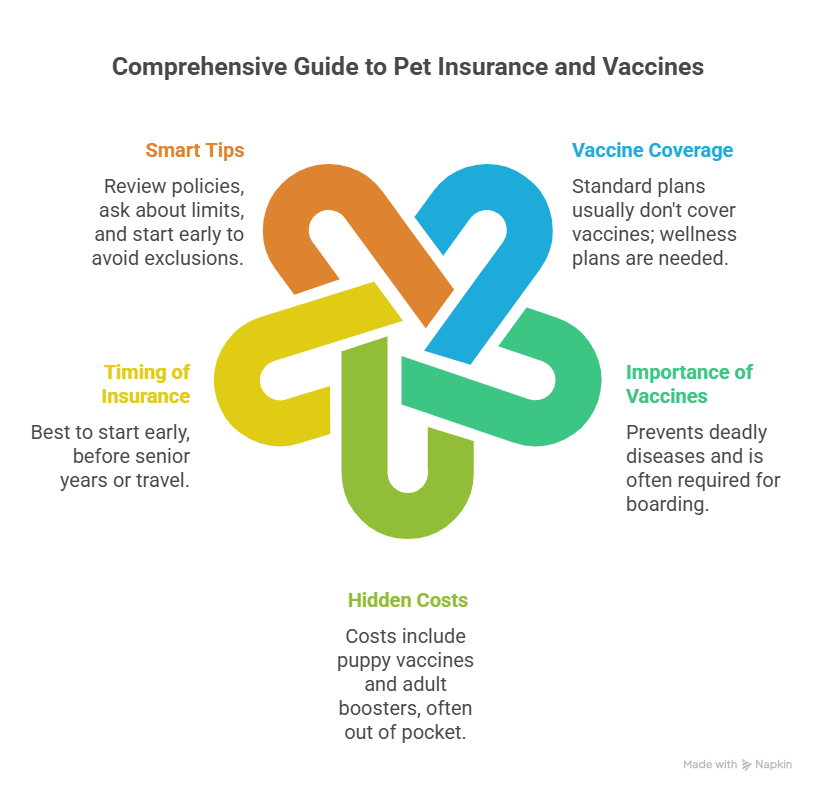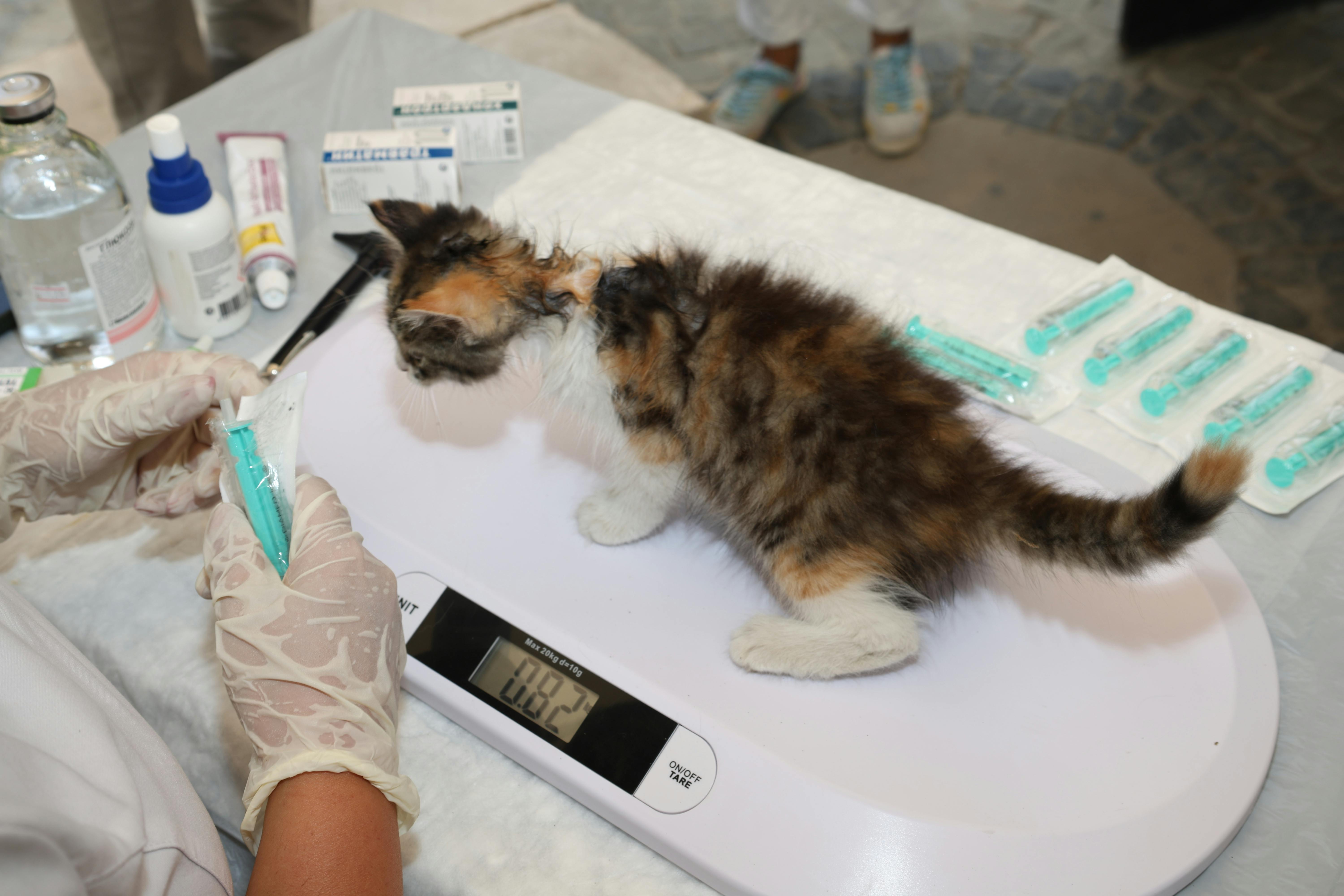As pet parents, we’d do anything to keep our furry family members healthy. But between surprise vet bills, confusing policies, and rising healthcare costs, many owners are left asking the same question: Does pet insurance cover vaccines, or will I be paying out of pocket?
At PetCoverage.ai, we help pet owners cut through the noise. Too many families are drained by hidden costs and unclear insurance terms. That’s why we provide free policy reviews, personalized guidance, and smart comparison tools that make health expenses more predictable. Our goal is simple: no owner should ever have to choose between their wallet and their pet's well-being. As licensed insurance brokers, we work with multiple carriers to find coverage that fits your needs and budget.
Why Vaccines Matter More Than You Think
Vaccines are the first line of defense against life-threatening illnesses. Just one missed shot can put your pet at risk for rabies, parvovirus, or feline distemper, diseases that can cost thousands to treat and, in some cases, become fatal.
Here’s the catch: while most pet owners assume pet insurance covers vaccines, routine care is often excluded from standard policies. That means:
You may need an add-on wellness plan to cover vaccines.
Without coverage, annual boosters come straight out of your pocket.
A single outbreak in your area can significantly increase veterinary costs.
Stat to note: The American Pet Products Association (APPA) reported that pet owners spent $38.3 billion on vet care and products in 2023, with preventive care like vaccines making up a major portion.

Does Pet Insurance Cover Vaccines? The Direct Answer
The straightforward answer: many standard pet insurance plans focus on accidents and illnesses rather than preventive care like vaccines. However, this varies significantly by insurance carrier and specific policy type. Vaccines fall under preventive care, something you can plan for, rather than an unexpected event.
Many insurers, however, offer wellness or preventive add-ons that typically cover:
Annual vaccines (rabies, distemper, parvovirus, etc.)
Flea, tick, and heartworm prevention
Annual wellness exams
Dental cleanings
Without these add-ons, you’ll be paying for every booster yourself. Depending on your location and veterinary clinic, dog and cat vaccines can cost approximately $20 to $150 per visit, though prices vary by region and clinic type, and that adds up quickly over your pet’s lifetime.
Case Study: How Wellness Coverage Saved One Family $800
The following is a composite example based on typical client experiences:
Take the case of Jenny, a first-time dog owner in California. When she adopted a Shih tzu puppy, she assumed her pet insurance plan covered all medical needs. Six months later, she was hit with a $400 bill for vaccines and preventives that weren’t included in her plan.
After upgrading to a wellness add-on, Jenny saved over $800 in preventive costs in just two years. More importantly, her dog stayed healthy without gaps in protection.
At PetCoverage.ai, we see this often. Pet parents who combine accident/illness coverage with wellness add-ons not only save on routine care but also gain peace of mind knowing every check-up is covered.
Individual savings will vary based on your pet's needs, chosen coverage, and location.
The Hidden Cost of Skipping Coverage
Here’s the warning: skipping vaccine coverage can backfire badly. Preventive care might feel optional, but the risks are serious:
Higher long-term bills: Treating parvovirus in dogs can exceed $2,000–$5,000, while the vaccine is less than $50.
Spread of disease: Unvaccinated pets are more vulnerable and can spread illnesses to others.
Denied boarding or daycare: Many facilities refuse unvaccinated pets, limiting your options.
Think of it this way: having pet insurance without wellness coverage is like having health insurance that doesn't cover preventive care like flu shots or annual checkups. You're covered for the big emergencies, but you're missing out on the preventive care that could help avoid those emergencies in the first place.
When to Get Pet Insurance (and Add Vaccine Coverage)
Waiting periods apply to most pet insurance policies. Wellness coverage may have different waiting periods than accident/illness coverage. Check with your specific carrier for details.
Timing matters. Enrolling early helps you avoid pre-existing condition exclusions that insurers use to determine coverage eligibility. Pre-existing conditions are health issues that occur before coverage begins or during waiting periods, and they're typically not covered by insurance.. The best times to consider coverage:
Puppy and kitten stage – vaccines are most frequent in the first year.
Before senior years – older pets have more exclusions and higher premiums.
Before travel or boarding – vaccines are often mandatory for entry.
Many owners ask: Should I have pet insurance if my pet is young and healthy? The answer is yes, because costs are lower when you start early, and you’ll be fully covered when your pet needs it most.
How to Get Pet Insurance That Actually Covers Vaccines
Not all policies are equal. Here’s how to make sure you’re covered:
Look for wellness add-ons: Confirm vaccines are specifically listed.
Compare annual limits: Some plans cap preventive care reimbursements.
Read the exclusions: Avoid plans that bury vaccine coverage in fine print.
Ask upfront: Don’t assume; request a coverage breakdown from the provider.
At PetCoverage.ai, we guide clients through these steps, helping them find insurance that matches both budget and medical needs. As licensed brokers, we can compare multiple carriers and explain the differences in plain English. Our free policy review service helps identify gaps in your current coverage – with no obligation to purchase anything.

How Our Free Review Works
Our free policy review involves analyzing your current coverage documents and comparing them against other available options in your state. We may receive commissions from insurance carriers if you choose to purchase a policy, but there's never any fee to you for our review or consultation services.
Frequently Asked Questions (FAQs)
1. Can I add vaccine coverage later?
Yes, but insurers may impose waiting periods. It’s best to add preventive care when you first enroll.
2. What happens if I skip vaccines completely?
Your pet risks serious illness, and many public spaces or groomers will refuse unvaccinated pets.
3. Are vaccine costs the same for cats and dogs?
No. Cat vaccines are often cheaper, but both can add up to hundreds yearly without coverage.
4. Does wellness coverage have waiting periods?
Yes, most wellness plans have waiting periods, though they're often shorter than accident/illness waiting periods. Typical waiting periods range from 14-30 days.
5. Are there vaccines that insurance never covers?
This varies by carrier, but some experimental or non-standard vaccines may be excluded. Always check your specific policy for covered vaccine lists.
6. How does reimbursement work for vaccine coverage?
This depends on your plan type. Some reimburse a percentage (like 70-90%), while others use a benefit schedule with set amounts per service.
Key Takeaways
Pet insurance isn’t just about covering emergencies; it’s about preventing the preventable. If there’s one thing to remember, it’s this: skipping vaccine coverage can cost more than adding it.
Secure Coverage That Includes Prevention: Choose a plan with wellness add-ons so vaccines aren’t left as out-of-pocket surprises.
Know What You’re Really Paying For: Review your policy closely; most standard plans exclude vaccines unless you add extra coverage.
Protect Your Pet’s Future Health: Preventive care today avoids painful, expensive illnesses tomorrow. Start with our free policy review at PetCoverage.ai.
We’ve uncovered why vaccine coverage matters, how hidden costs add up, and the smart steps pet parents can take to avoid nasty surprises.
Disclaimer
Insurance products are subject to terms, conditions, and exclusions not described here. Coverage and availability vary by state. This article is for informational purposes only and should not be considered veterinary or specific insurance advice. Always consult with your veterinarian for medical advice and review actual policy documents for coverage details.
For ongoing tips, guides, and real-life stories on protecting your pet’s health, follow Facebook, Instagram, TikTok, and LinkedIn.
This article is provided for educational purposes by Coverage Clarity LLC (NPN #21556911), a licensed insurance brokerage. Coverage details vary by state, carrier, and individual policy. Please consult your specific policy documents or a licensed insurance professional for personalized advice.



